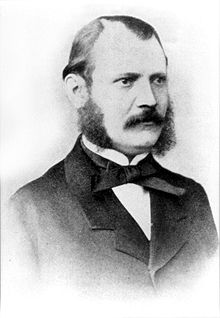Theodor von Sickel
Theodor Sickel , since 1884 Knight von Sickel (born December 18, 1826 in Aken ; † April 21, 1908 in Meran , South Tyrol ) was a German-Austrian historian and diplomat .
Life
Theodor Sickel was born into a strictly Protestant pastor family and began studying Protestant theology in Halle (Saale) in 1845 - in line with the family tradition of committed church activities . He later moved to Berlin , where he decided to study history. He received his doctorate in Halle in 1850 with the dissertation Ducatus Burgundiae quo modo et quo jure translatus est ad gentem Valesiam? Since he had actively participated in the 1848 revolution and was against Prussian policy after 1848, he went to Paris , where he attended the École nationale des chartes .
On behalf of the French Ministry of Education, he carried out archival research in northern Italy on the Sforzas' relationship with France , where he already established contacts with Austrian historians. His French research assignment was later extended to Vienna, where he had been based since 1855. In 1857 he became an associate professor and member of the Institute for Austrian Historical Research (IfÖG). In 1867 he became a full professor and from 1869 to 1891 he was director of the IfÖG. Here he devoted himself primarily to training in the historical auxiliary sciences of diplomatics , palaeography and chronology . From 1870 he was also a full member of the Academy of Sciences . In 1884 he was accepted as a foreign member of the Bavarian Academy of Sciences . After Pope Leo XIII opened the Vatican archives . In 1881 he founded the Austrian Historical Institute in Rome , which he also headed personally between 1891 and 1901.
His awards included the elevation to the hereditary Austrian knighthood (1884), the title of kuk Hofrat and a seat in the manor of the Austrian Imperial Council (from 1889). In 1902 he received the Bavarian Maximilian Order for Science and Art . In 1932 the Theodor-Sickel-Gasse in Vienna- Favoriten was named after him.
Sickel was married to Anna Semper, Gottfried Semper's daughter , without children.
Scientific achievement
In the second half of the 19th century, Sickel put diplomacy (doctrine of documents) on a new basis. First and foremost, he devoted himself to working out the diplomatic method of comparing scripts and dictations in early medieval documents, which, however, also proved to be viable in more recent sources and which he developed almost to perfection in several editions and analytical studies. In 1875 he was accepted into the Monumenta Germaniae Historica , where he immediately became a member of the central management and head of the Diplomata department. As part of this activity, he edited more than 1,300 diplomas from the 10th century from Conrad I to Otto III. : The documents of Konrad I, Heinrich I and Otto I (MGH Diplomata 1, 1879); Otto II's documents (MGH Diplomata 2/1, 1888); The documents of Otto III. (MGH Diplomata 2/2, 1893). Sickel was one of the first historians to use modern technical methods ( photography ): In addition to the monumenta graphica medii aevi , which included codicological and diplomatic sources of the Habsburg monarchy, he published the imperial documents in illustrations, partly together with Heinrich von Sybel .
Sickel was also the founder of the periodical " Mitteilungen" of the Institute for Austrian Historical Research .
Works (selection)
- Monumenta graphica medii aevi ex archivis et bibliothecis imperii Austriaci Fasc. I-X. Vienna 1859–1882.
- Contributions to diplomacy I – VIII. Vienna 1861–1882.
- Acta regum et imperatorum Karolinorum digesta et ennarata. Volume 1: Doctrine of Document , Volume 2: Documentation. Vienna 1867.
- with Heinrich von Sybel : Imperial certificates in illustrations. Delivery I – XI. Berlin 1880-1891.
- MGH. Diplomata regum et imperatorum Germaniae. Volume 1: Conradi I., Heinrici I. et Ottonis I. Diplomata ; Volume 2.1: Ottonis II. Diplomata , 1888; Volume 2.2: Ottonis III. Diplomata. , Hanover 1879–1884.
- Roman reports. 5 volumes. Gerold, Vienna 1895–1901.
- Roman memories. Edited by Leo Santifaller . Universum, Vienna 1947.
literature
- Constantin von Wurzbach : Sickel, Theodor . In: Biographisches Lexikon des Kaiserthums Oesterreich . 34th part. Kaiserlich-Königliche Hof- und Staatsdruckerei, Vienna 1877, pp. 215–219 ( digitized version ).
- Emil von Ottenthal : Theodor von Sickel. In: Communications from the Institute for Austrian Historical Research. Volume 29, 1908, pp. 545-559.
- Michael Tangl : Theodor von Sickel. In: New archive of the society for older German history. Volume 33, 1908, pp. 773-781.
- Horst Fuhrmann : "Everything was just human". Scholarly life in the 19th and 20th centuries. Shown using the example of the Monumenta Germaniae Historica and its staff. Beck, Munich 1996, p. 49 ( online ).
- Winfried Stelzer : Sickel (Friedrich Adolf) Theodor von. In: Austrian Biographical Lexicon 1815–1950 (ÖBL). Volume 12, Verlag der Österreichischen Akademie der Wissenschaften, Vienna 2001-2005, ISBN 3-7001-3580-7 , p. 223 f. (Direct links on p. 223 , p. 224 ).
- Winfried Stelzer: Sickel, Friedrich Adolf Theodor Ritter von. In: New German Biography (NDB). Volume 24, Duncker & Humblot, Berlin 2010, ISBN 978-3-428-11205-0 , pp. 309-311 ( digitized version ).
Web links
- Sickel, Theodor Ritter von (1884) Dr. phil. . Short biography on the website of the Austrian Parliament
- Literature by and about Theodor von Sickel in the catalog of the German National Library
- Institute for Austrian Historical Research: Theodor von Sickel on the oil painting by Viktor Krämer (1905)
- Short biography with picture
- Estate, inventory online
- Obituary in the Meraner Zeitung of April 24th, 1908 Digital copy of the regional library “Dr. Friedrich Teßmann "
| personal data | |
|---|---|
| SURNAME | Sickel, Theodor von |
| BRIEF DESCRIPTION | German-Austrian historian |
| DATE OF BIRTH | December 18, 1826 |
| PLACE OF BIRTH | Aken |
| DATE OF DEATH | April 21, 1908 |
| Place of death | Meran |

